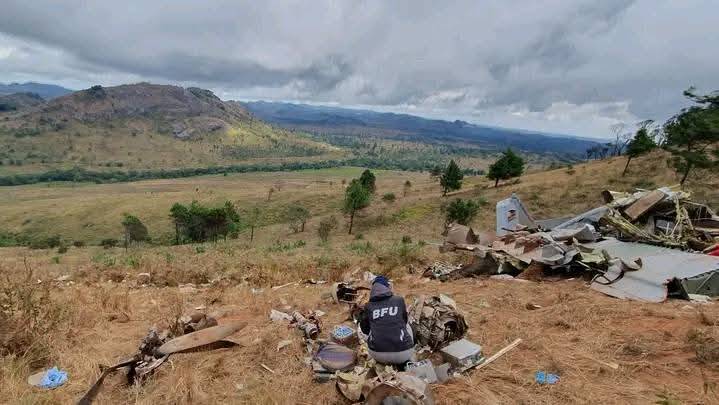LILONGWE — The final report into the plane crash that claimed the life of Malawi’s Vice President Dr. Saulos Klaus Chilima and eight others on June 10, 2024, has now been made public—and it paints a sobering picture of poor decisions, tough weather, and systemic weaknesses in Malawi’s aviation framework.
Compiled by Germany’s Federal Bureau of Aircraft Accident Investigation (BFU), the 67-page report, published on the BFU website and shared with bereaved families in Lilongwe, points to a tragic confluence of bad weather, pressure on the flight crew, and poor preparation as the primary causes of the disaster.
Speaking to reporters, Information Minister Moses Kunkuyu confirmed the release of the final report and urged Malawians to read it in full online. The Shire Times has done so, and the findings are as disturbing as they are instructive.
According to the report’s page 53, the aircraft “flew into instrument meteorological conditions during a visual flight,” meaning the pilots were navigating with their eyes when they should have been relying on instruments, due to low visibility. As a result, the aircraft collided with mountainous terrain in Nkhatabay.
The BFU found that the pilots’ decision to proceed in such marginal weather, combined with “lack of situational awareness” and “inadequate pre-flight preparation,” ultimately led to the crash. More haunting still, the report on page 46 raises the possibility of subtle or indirect pressure influencing the Pilot-in-Command—possibly from the passengers or self-imposed by the pilot—due to the urgency of reaching a state funeral scheduled for 10:00 a.m.
The report’s interim findings had already prompted the BFU to recommend that all Malawi Air Force planes carrying VIPs be fitted with functional emergency locator transmitters (ELTs), and that Malawi’s Minister of Transport ensure updated radio navigation data is always available for pilots.
The final report adds four more recommendations—each addressing structural gaps in Malawi’s aviation safety protocols.
First, the Department of Civil Aviation is urged to ensure that radar data and radio traffic are recorded and stored at major airports for a minimum of 30 days. This would allow investigators to reconstruct incidents with far greater accuracy.
Second, the Civil Aviation Authority and Department of Meteorological Services must provide real-time weather information—not just for the destination airport, but along the route and at alternate landing sites.
Third, the Malawi Air Force is instructed to keep updated aero-medical records of all flight crew, ensuring no pilot flies with expired or incomplete health certification.
Finally, the Air Force is advised to perform risk assessments for all transport aircraft operations, including formalising safety procedures to prevent similar tragedies.
While no single factor caused the crash, the final report lays bare the critical need for enhanced operational discipline and investment in aviation safety. “This wasn’t simply an accident caused by bad weather,” an aviation expert told Shire Times. “It was a chain of poor decisions in an unsafe system, waiting to snap.”
The BFU’s findings are both a warning and a call to action. Whether Malawi listens—and acts—will define the legacy of this national tragedy.













